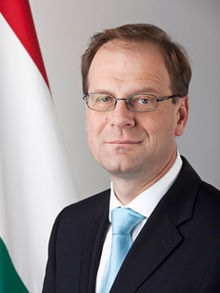Tibor Navracsics
Tibor Navracsics | |
|---|---|
 | |
| European Commissioner for Education, Culture, Youth and Sport | |
| In office 1 November 2014 – 30 November 2019 | |
| President | Jean-Claude Juncker |
| Preceded by | Androulla Vassiliou |
| Succeeded by | Mariya Gabriel |
| Minister of Foreign Affairs and Trade | |
| In office 6 June 2014 – 23 September 2014 | |
| Prime Minister | Viktor Orbán |
| Preceded by | János Martonyi |
| Succeeded by | Péter Szijjártó |
| Deputy Prime Minister of Hungary | |
| In office 2 June 2010 – 6 June 2014 Served alongside Zsolt Semjén | |
| Prime Minister | Viktor Orbán |
| Preceded by | Péter Kiss |
| Succeeded by | Zsolt Semjén |
| Minister of Public Administration and Justice | |
| In office 29 May 2010 – 6 June 2014 | |
| Prime Minister | Viktor Orbán |
| Preceded by | Imre Forgács |
| Succeeded by | László Trócsányi |
| Personal details | |
| Born | 13 June 1966 Veszprém, Hungary |
| Political party | Fidesz (since 1994) |
| Spouse(s) | Anikó Prevoz |
| Children | 2 |
| Alma mater | Eötvös Loránd University |
Tibor Navracsics (born Veszprém, Hungary, 13 June 1966) is a Hungarian lawyer and politician, who served as Minister of Foreign Affairs and Trade from June to September 2014. He previously served as Minister of Administration and Justice between 2010 and 2014. He is a member of the Fidesz and was the European Commissioner for Education, Culture, Youth and Sport in the Juncker Commission.
Education[]
Navracsics holds a degree in law (Eötvös Loránd University 1990) and a higher degree as judge (1992). He also received a PhD in political science (Eötvös Loránd University 2000)
Career[]
- 1990–1992: Municipal Court, City of Veszprém – Tribunal Clerk;
- 1992–1993: Regional Assembly of Veszprém County – Research Fellow;
- 1993–1997: University of Economics, Budapest, Department of Political Sciences – Assistant Professor;
- 1997– 2001: Department of Political Sciences – Associate Professor
- 1998–1999: Prime Minister's Office, Communications Department – Head of Department, (Viktor Orbán's Cabinet);
- 1999–2002: Prime Minister's Office, Department for Press and Information – Head of Department;
- 2002–2003: Parliamentary Group of Fidesz – Hungarian Civic Union, Head of Department for Political Analyses;
- 2003–2006: Fidesz – Hungarian Civic Union, Chief of President's Cabinet;
- 2004– Leader of the program-creating team, referred to as "Civic Governance";
- 2006– Member of Parliament
- 2001– : Department of Political Sciences Eötvös Loránd University – Senior Associate Professor
- 2006– : Fidesz – Hungarian Civic Union – Leader of the Fraction
- The Congress of Fidesz in May, 2007, has accepted his (Navracsics's) polemical essay "Our Future";
- Member of the Political Sciences Association
- 2010 – 2014: Minister of Public Administration and Justice
- 2014: Minister of Foreign Affairs and Trade
Professional experiences[]
- 1990–1992: Department of Social Sciences at the University of Veszprém – Lecturer;
- 1992–1998: Dániel Berzsenyi Teacher's College, Szombathely – Department of Sociology and Political Sciences – Lecturer;
- 1992–1993: Periodical Comitatus – Editor;
- 1998–2000: Secretary General of the Hungarian Association of Political Scientists;
- 1996– : Vice-President, Association of the Hungarian Institute for Political Science;
- 1999– : Member of the Editorial Board, Politikatudományi Szemle (Political Science Review);
- 2001– : Member of the Presidency, Hungarian Association of Political Science
Publications[]
- Európai belpolitika (Internal Politics in the European Union). Budapest: Korona, 1998
- Political Analysis of the European Union, Bp., Korona, 1998
- Political Communication, 2004 (co-author: István Hegedűs-Szilágyi-Mihály Gál-Balázs Sipos)
Field of research[]
Navracsics's field of research are comparative politics and internal politics in the European Union. Because he speaks Serbocroatian, he wrote a number of analyses regarding the former Yugoslavia.
Notable facts[]
- At the invitation of the presidency he wrote about the ground values of the party a manifesto, after he organized several public debates on the topics of living standards, competitiveness, public services and justice. The manifesto was accepted by the 2007 Congress of the Fidesz – Hungarian Civic Union.
- He was elected "Teacher of the Year 2007" by the students of ELTE.
- On 6 October 2014, the European Parliament proposed to reject him as EU commissioner-designate since he was found unsuitable for the post related to citizenship.[1] Instead he was given the portfolio for Education, Culture, Youth and Sport.
References[]
- ^ "MEPs reject Hungary's Navracsics for top EU culture job". Retrieved 7 October 2014.
External links[]
- 1966 births
- Living people
- Fidesz politicians
- Foreign ministers of Hungary
- Government ministers of Hungary
- Hungarian European Commissioners
- Justice ministers of Hungary
- Members of the National Assembly of Hungary (2006–2010)
- Members of the National Assembly of Hungary (2010–2014)
- Members of the National Assembly of Hungary (2014–2018)
- European Commissioners 2014–2019
- People from Veszprém